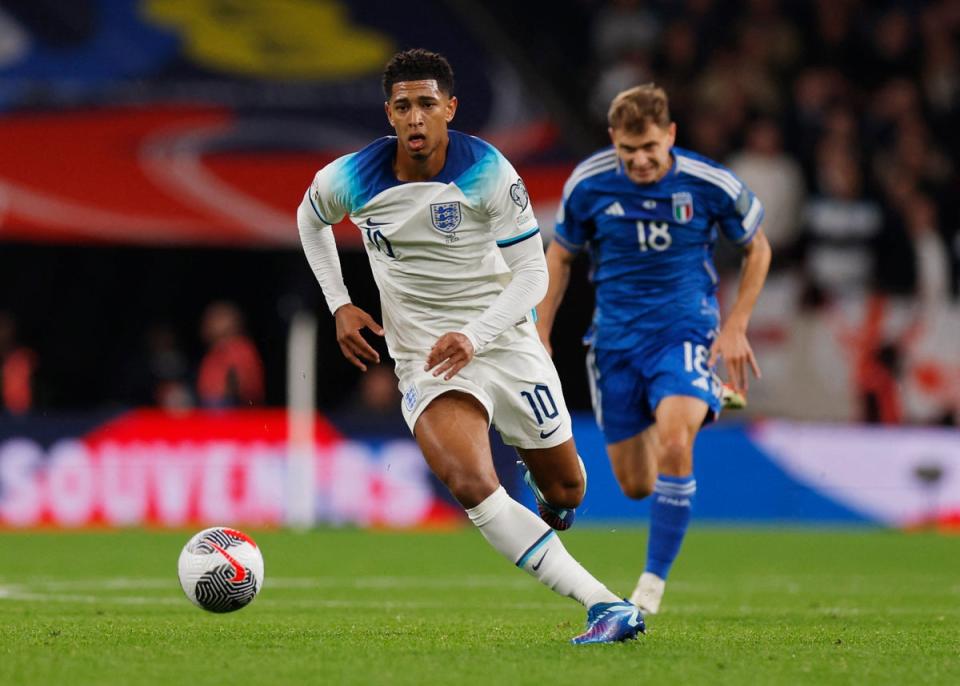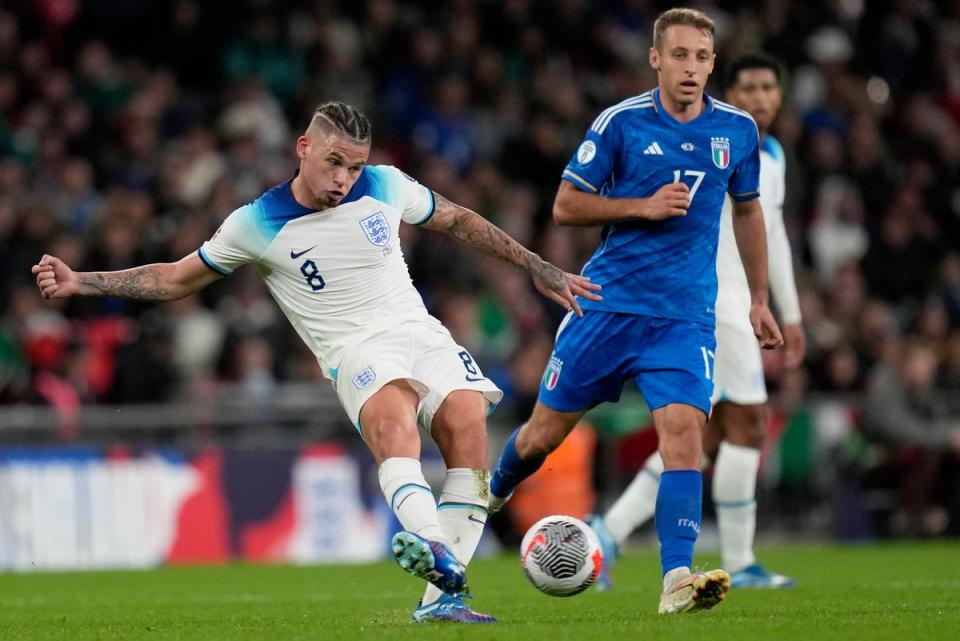Jude Bellingham once again proves he is the key for England’s Euro 2024 hopes
A couple of weeks earlier, Giovanni Di Lorenzo had perhaps the best view of Jude Bellingham’s burgeoning greatness. Not from his perspective, admittedly; there was little enjoyable about it as, close as he was, he was also powerless, backtracking as Bellingham slalomed through the Napoli defence, scoring for Real Madrid after a mesmeric solo run.
If the Napoli captain was determined to avert a repeat, he did when Bellingham surged clear. The methodology was agricultural, the cost a penalty for a scything challenge. Neither approach worked, each brought a goal, the second a Harry Kane spot kick. But if one of the world’s best right-backs struggled to find an answer to the question of how to stop Bellingham, he was not alone.
Bryan Cristante, seeing the prodigy in full flight, opted for a nudge in the back. It proved a cunning tactic, conceding a free kick, but not incurring a booking. Poor Francesco Acerbi found himself stranded in no-man’s land, lobbed brilliantly by Bellingham as he sent Marcus Rashford away to score the goal that, along with Kane’s clincher, sealed England’s place in Euro 2024.
It could be Bellingham’s tournament. And if the same can be said of many another, the speed of his ascent and the range of his talents are such that there is a credence to the theory. England players have entered such a stage before as officially among the sport’s best – Frank Lampard and Steven Gerrard finished in the top three of the Ballon d’Or vote in 2005, without justifying such a status at the following year’s World Cup – and have ended up looking overhyped and underachieving. For now, in the heady stage when he is untarnished by failure, everything seems possible for Bellingham.
A rescue act against Italy is unlikely to live as long in England folklore as David Beckham’s free kick against Greece, even though each booked a place at a tournament. In part, it is because England had the insurance policy of extra games and, coming earlier in another match England began in undistinguished fashion, it felt less dramatic. But less surprising, too, because this, increasingly, is what Bellingham does. He wins games, and in different ways.
His dynamism brought England’s equaliser, the explosiveness to run between and behind defenders. His deftness produced the goal that gave England a lead they did not relinquish. It was power and poise, physique and technique. Much as England want to become a possession team – and, in 2012 and 2014, Italy’s Andrea Pirlo highlighted how they lacked a similar quality in their midfield – he lends them a counter-attacking menace.
Bellingham’s sharpness on the break reflected his role: part third midfielder, part fourth forward. If Gareth Southgate has adapted, he has been influenced by Carlo Ancelotti. England’s No 10 is the man with 10 in 10 for Real.

If England are building a team around Bellingham, perhaps it is a lesson Southgate learned from their chequered past. They did not around either Lampard or Gerrard, often forcing each into an uneasy compromise with the other. For now, a beneficiary of Bellingham’s brilliance was Kalvin Phillips. Selected as a facilitator, to sit alongside Declan Rice and allow the younger man to get forward, Phillips proved the anti-Bellingham in unwanted fashion.
If one is at the top of his game, the other is near the bottom. Phillips’ rustiness was apparent in a series of fouls, stemming less from malice than sheer haplessness. He showed the willingness to crunch into challenges; but invariably too late. Booked in the eighth minute for upending Davide Frattesi, he ought to have been expelled for a second-half foul on Nicolo Barella. Certainly Luke Shaw was sent off for less when these side met in Naples in March.

That victory, the seminal result in England’s qualification, was also much Phillips’ best performance since joining Manchester City; albeit conspicuously not for Manchester City. It may have influenced Southgate’s thinking: even as he may be, with no exaggeration, City’s ninth-choice central midfielder now, he seemed capable of resurrecting his England form. His nickname – ‘the Yorkshire Pirlo’ – was never entirely serious, but never appeared so utterly inappropriate. Southgate took him off before he could be sent off, bringing on Jordan Henderson, to some boos but mostly audible cheers.
It was a substitution to highlight twin problems ahead of Euro 2024. Southgate has to spend more of his time defending his defensive midfielders. There are reasons to exclude each of Henderson and Phillips; the reasons to include them may be a lack of alternatives the manager values as highly. But if Phillips could have exited Wembley amid the ignominy of a red card, for Bellingham, a substitution came to a standing ovation. As against Scotland, other historic foes, he had been the outstanding player on the pitch. But then he often is.

 Yahoo Sport
Yahoo Sport 



































































